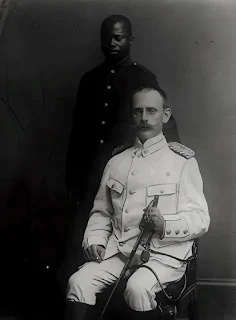Why German is Spoken in East Africa
Why German is Spoken in East Africa
Carl Peters, a German lawyer and adventurer, played a central role in bringing the German language and administration to East Africa during the late 19th century. With less than $12,500—roughly $400,000 today—he embarked on a mission that would permanently shape the linguistic and political landscape of the region.
In 1884, Dr. Peters, holding a doctorate in international law, set out for East Africa, where he signed controversial treaties with tribal chiefs and local leaders. These agreements laid the foundation for the German East Africa Company, which became the backbone of Germany’s colonial presence in the region.

Carl Peters, Doctor of Law
The Birth of German East Africa
Peters founded the Society for German Colonisation and raised $10,000 (about $300,000 today) from like-minded adventurers. On November 4, 1884, he departed for Zanzibar, intent on establishing Germany’s foothold in East Africa.
As Chairman and General Manager of the new German East Africa Company, he sought concessions from Sultan Barghash bin Said of Zanzibar for key ports such as Dar-es-Salaam and Pangani. By July 30, 1887, he had secured a temporary agreement with the Sultan, followed by a formal treaty on April 22, 1888.
The agreement granted the company control from the Umba River to Cape Delgado for 50 years—covering policing, taxation, and justice under the Sultan’s name. It also permitted the company to claim unowned lands, forests, and mines, and to collect customs duties in exchange for a 5 percent commission.
Did You Know?
- The company’s original charter allowed it to issue its own currency—making it one of the few private colonial companies with that privilege.
- German East Africa encompassed present-day Tanzania, Burundi, and Rwanda.
- Dar-es-Salaam’s name, Arabic for “Haven of Peace,” became a center for German colonial administration.
Language and Colonial Governance
Once the German East Africa Company gained control of coastal and inland territories, the German language was adopted for administration and governance. Official documents, court proceedings, and education within mission schools were conducted in German, embedding it into local bureaucratic systems.
Despite widespread resistance from local leaders and Arab governors, German remained the official language of administration until World War I, when Britain took over German East Africa. Even then, German linguistic traces persisted, influencing Swahili vocabulary and colonial-era records.
The Fall of Carl Peters
By the 1890s, resistance and uprisings made German control increasingly unstable. Peters was accused of brutality and the mistreatment of Africans on the slopes of Mount Kilimanjaro between 1891 and 1892. He was later tried and sentenced to prison in Germany for abuses committed under his authority.
Following his release, Peters lived as a controversial author until his death in 1918. His legacy remains contested—some view him as a pioneer of German colonialism, others as a symbol of its moral failure.
German’s Lingering Legacy in East Africa
Today, remnants of the German language still exist in Tanzania’s architecture, legal archives, and even Swahili loanwords. Streets, schools, and churches built during the German era stand as linguistic and cultural echoes of a turbulent colonial chapter.
Frequently Asked Questions
When did Germany colonize East Africa?
Germany’s colonial involvement began in 1884 under Carl Peters through the German East Africa Company, later formalized as the colony of German East Africa in 1888.
Why was the German language introduced?
German was the administrative and legal language for governance, contracts, and trade, reflecting the colonial authority’s dominance and structure.
Which modern countries were part of German East Africa?
The territory included present-day Tanzania, Rwanda, and Burundi.
Does German influence remain today?
Yes. German-era infrastructure, Swahili words of German origin, and historical archives continue to reflect that influence in East Africa’s linguistic landscape.

























